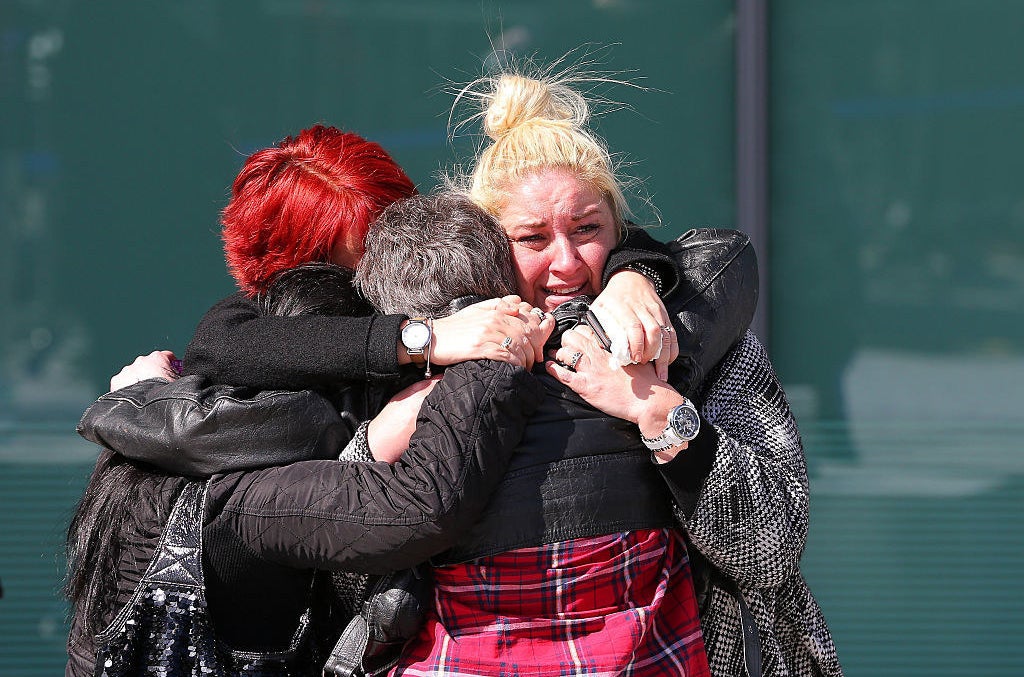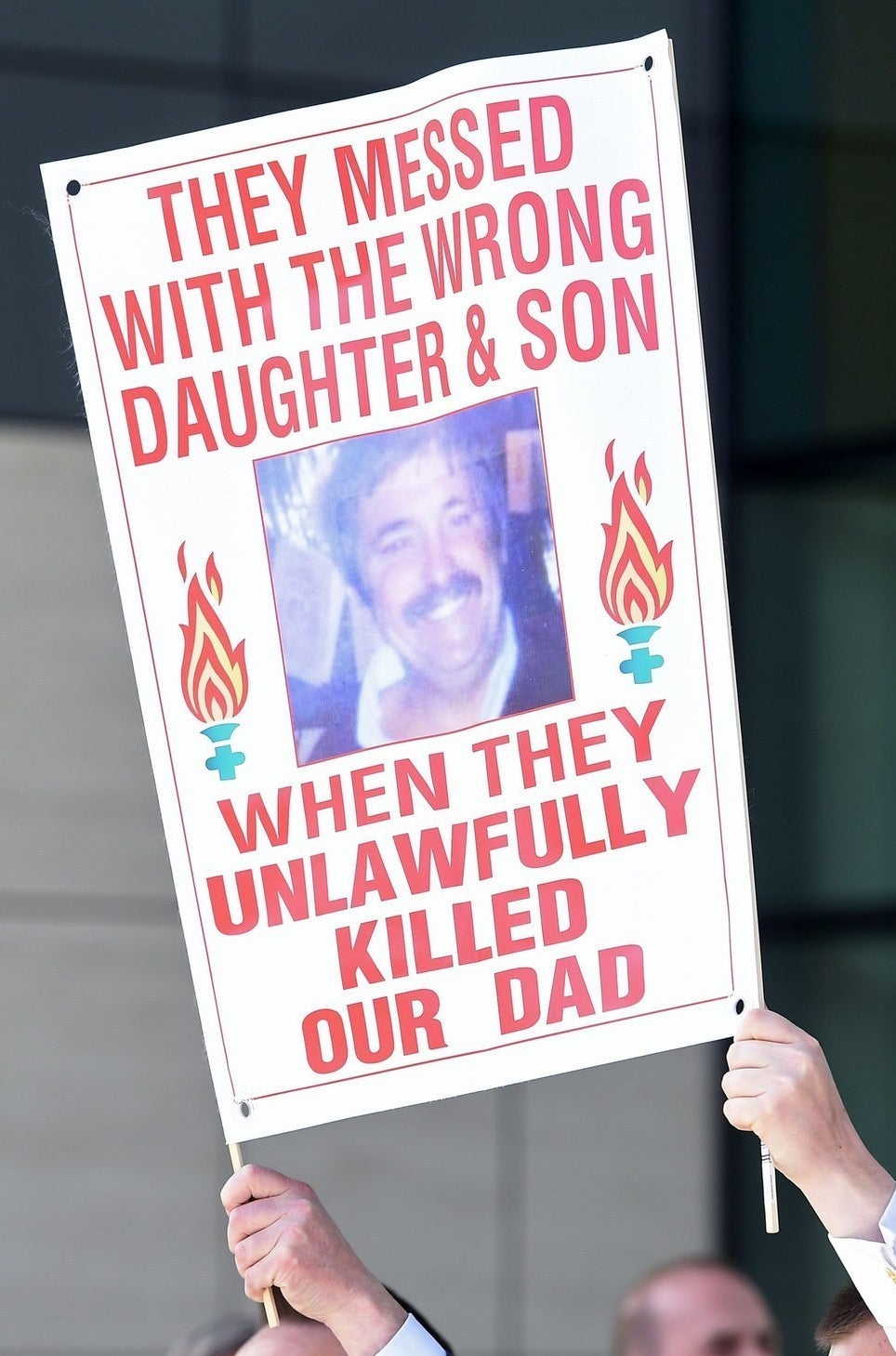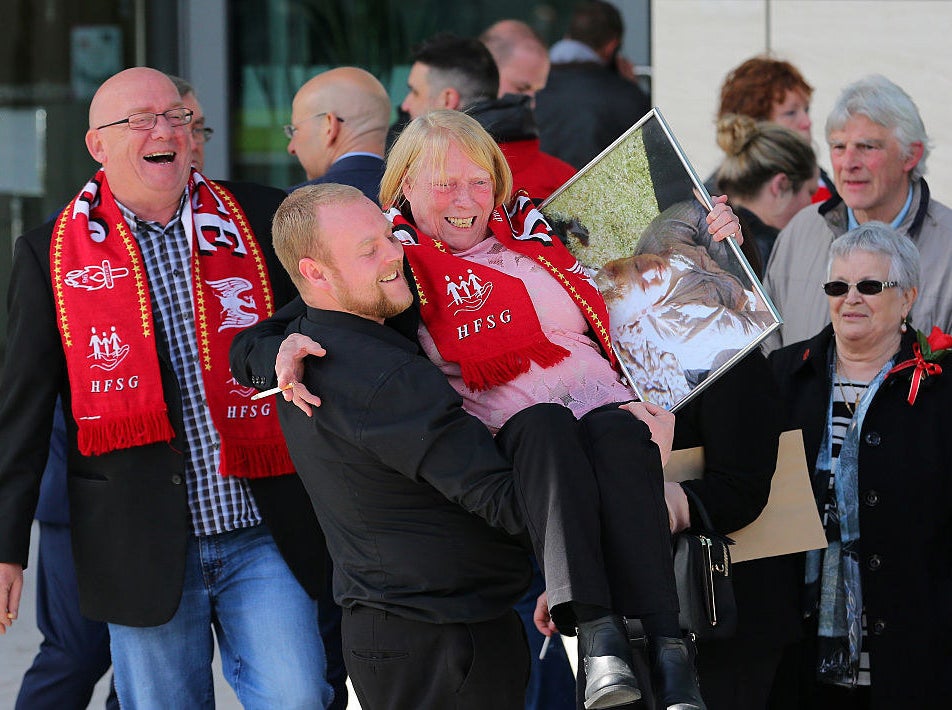
All 96 Liverpool fans who died at Hillsborough stadium in April 1989 were unlawfully killed as a result of a serious errors by the police officer commanding the match, an inquest jury ruled on Tuesday.
Twenty-seven years after the disaster, and after two years of evidence, the inquest jury ruled by a majority verdict that the 89 male and seven female victims lost their lives due to "gross negligence" on the part of Chief Superintendent David Duckenfield of South Yorkshire police.
The jury also concluded that fans were not to blame for the tragedy, a vindication for the bereaved families, who have fought for years against claims by South Yorkshire police that the dangerous situation was caused by drunk and rowdy supporters.
The coroner, Sir John Goldring, told jurors at Birchwood Park coroners' court in Warrington, Cheshire, that to reach the unlawful killing verdict they would have to be sure that a "reasonably competent and careful" match commander would have foreseen the risks unfolding.


In 2015 Duckenfield admitted to the inquest under cross-examination from Michael Mansfield QC, lawyer for the victims' families, that he had not told the whole truth about mistakes he made on the day of the match.
Of those who died, 78 were under 30. The youngest was just 10 years old. All were Liverpool supporters who were at Sheffield Wednesday's Hillsborough stadium to see the FA Cup semi-final between Liverpool and Nottingham Forest on 15 April 1989.
David Crompton, South Yorkshire police chief constable, said in a statement delivered after the verdicts that the force apologised "unreservedly" to the families of the victims for its failures.
"I want to make it absolutely clear that we unequivocally accept the verdict of unlawful killing and the wider findings reached by the jury in the Hillsborough inquests," he said.
"On 15 April 1989, South Yorkshire police got the policing of the FA cup semi-final catastrophically wrong."
After nine days' deliberation, the jury also delivered unanimous verdicts on 13 other questions they'd been tasked with answering, including that the deaths were caused by "crushing in the central pens of the Leppings Lane terrace, following the admission of a large number of supporters to the stadium through exit gates".
Hillsborough jurors have come to a unanimous decision on 13 questions and a majority on 'unlawful killing'. #SSNHQ
The jury ruled that:
– The deaths were caused by crushing on the terraces
– Police planning errors contributed to the deaths, as did mistakes in how the turnstiles were managed
– Defects in the stadium contributed to the deaths
– Mistakes were made over the order to open the Leppings Lane gate
– Police made a mistake in failing to declare a major incident sooner
As the verdicts were read out, relatives of those who died punched the air, while others wept. The families then broke into a spontaneous rendition of "You'll Never Walk Alone", Liverpool FC's anthem, and a chant of "Justice for the 96".
Emotional relatives of #Hillsborough victims emerging from the inquiry break out into song https://t.co/T0v9gpN0qL
The police watchdog, the Independent Police Complaints Commission (IPCC), is carrying out an investigation into whether police are guilty of criminal acts and/or misconduct.
The IPCC is considering several alleged crimes, including whether police statements were amended, whether misleading information was passed to the media and to MPs, and whether the families of the dead were subject to surveillance.
The investigation has become the biggest in the IPCC's history, with more than 4,000 statements and 1,200 interviews so far, from witnesses including MPs and journalists. There are 220 staff working on the investigation. Both the IPCC and a separate independent police inquiry, Operation Resolve, plan to send their evidence to the Crown Prosecution Service (CPS) by the end of the year.


The IPCC's deputy chair, Rachel Cerfontyne, said in a statement: "Now the inquests have ended our role in providing documents and other material to support the Coroner is over. However the end of the inquests does not mark the end of the process. Our attention now focuses on concluding our criminal investigation into the aftermath of the disaster. This is by far the biggest and most complex investigation ever undertaken by the IPCC.
“We have made significant progress on the investigation and we will continue to work closely with Operation Resolve and the Crown Prosecution Service to pursue our remaining lines of enquiry as quickly and as thoroughly as possible. I anticipate we will conclude the criminal investigations by the turn of the year.”
Assistant Commissioner Jon Stoddart, the officer in charge of Operation Resolve, said: "Now that the inquests have concluded my sole focus is on completing the criminal investigation which I expect will be finished by the turn of the year. It will then be for the Crown Prosecution Service to consider the evidence and decide whether any individual or organisation should face criminal prosecution."
The CPS said it would consider whether any criminal charges should be brought "in due course" against any individuals or organisations.

The ruling comes after a long fight from the families of the 96 victims and their lawyers. In 2012 the verdict from an earlier inquest in the winter of 1990-91 was quashed and a fresh inquest ordered by the attorney general.
The Hillsborough disaster occurred while British football was struggling to deal with the the growth of hooliganism and violence among fans, leading police reports and subsequent media coverage to blame drunken fans who arrived late at the ground for the tragedy.
But as the lord chief justice said when granting the new inquest: "Within a very short time it was being peddled about that this disaster was one more consequence of the kind of hooliganism which had manifested itself at and around football matches during the 1980s.
"There was therefore fertile ground for the acceptance of rumour, gossip, and deliberate misinformation. In short the disaster was attributed to the drunken misbehaviour of the fans, and the Liverpool fans in particular."
However, a report from Lord Justice Taylor written four months after the disaster concluded that "the main reason for the disaster was the failure of police control".
The inquiry heard that of 164 police statements from witness and officers, more than 100 had been amended or altered.
Margaret Aspinall, chair of the Hillsborough Family Support Group, whose son James died in the disaster, wrote on ITV.com: "All of the documentation was there. All video coverage was there. The truth was there 27 years ago.
"For families to have to fight for so long, just to get where we are today is a disgrace and shame on the system.
"Any files should have been given to the families straight away. This was a needless journey that none of us should have had to have gone through."

Among those paying tribute to the families of the 96 victims and their long campaign was prime minister David Cameron.
Landmark day as the #Hillsborough inquest provides long overdue justice for the 96 Liverpool fans who died in the disaster.
I would like to pay tribute to the extraordinary courage of #Hillsborough campaigners in their long search for the truth.
Labour MP Andy Burnham, who has long supported the families' fight for justice, said in a statement: "This has been the greatest miscarriage of justice of our times. But, finally, it is over. After 27 long years, this is real justice for the 96, their families and all Liverpool supporters. The survivors of this tragedy can finally be remembered for what they were on that day – the heroes of Hillsborough who tried to help their fellow fans.
"The Hillsborough Independent Panel gave us the truth. This inquest has delivered justice. Next must come accountability. For 27 years, this police force has consistently put protecting itself above protecting those hurt by the horror of Hillsborough. People must be held to account for their actions and prosecutions must now follow.
"Disgracefully, lawyers for retired police have attempted to continue the cover-up in this courtroom. They made it an adversarial battle in defiance of the Lord Chief Justice’s ruling. This has been brutal on the Hillsborough families and put them through hell once again. The current leadership of South Yorkshire Police needs to explain why it went back on its 2012 apology at this inquest, prolonging the agony for the families."

Deborah Coles, director of criminal justice charity Inquest, which has supported the families of the victims, said: "For nearly three decades, the bereaved families and survivors of Hillsborough have been failed repeatedly at multiple levels by investigative and judicial processes.
"These were concerned more with an instinct to evade blame and responsibility than the need to deliver truth and accountability. The grief and suffering of generations of family members and survivors has thereby been exacerbated."
